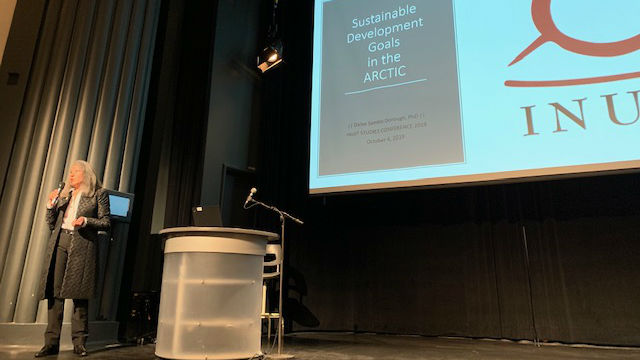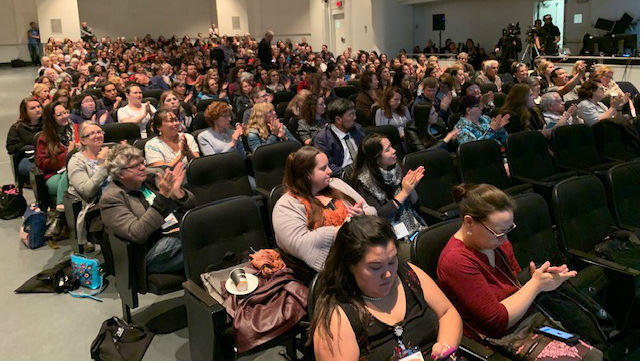“It’s important to be aggressive about our human rights,” international Inuit leader tells Montreal conference

With international interests increasingly active in the Arctic, it’s more important than ever that Inuit stand up for their human rights, the international chair of the Inuit Circumpolar Council (ICC) said in a keynote address at the Inuit Studies Conference in Montreal on Friday.
Climate change, shipping, food insecurity, industrialised fishing and global extractive industries are putting mounting pressure on Inuit Nunaat — the term Inuit use to describe their traditional territory in Russia, Alaska, Canada and Greenland — Dalee Sambo Dorough said at her keynote address at the Sherbrooke Pavilion Amphitheatre at the Université du Québec à Montréal (UQAM).
“It’s important to be aggressive about our human rights,” Dorough told the packed crowd of over 200 people. “It’s OK to assertive and insist on the recognition of these particular rights.”
Dorough’s talk, titled “Sustainable Development Goals (SDGs) in the Arctic”, looked at the various international legal instruments in place that support Indigenous self-determination and urged Inuit to apply them at every level possible from the personal to the political.
(The 17 United Nations Sustainable Development Goals (SDGs) were established by the UN in 2015 to guide international development.)
“We as Arctic Indigenous Peoples are the originators of sustainable development,” Dorough said.
“We have all the tools and mechanisms to achieve self-determination in the Arctic but we need for governments and 3rd parties to be responsive to that legal order.”.

Dorough also said Inuit need to be vigilant of the increasing desire of the global community to have a say in the development of the North.
“Non-Arctic states need to understand the nature and content of our human rights,” Dorough said. “But I don’t think the government of China has sat down in the context of their Arctic policy and considered that we own land and own resources and have the right of self determination.
“I’m pretty sure China has not studied the extent of the rights of the Inuit throughout the whole circumpolar region as to what role we should play and the seat we should have at the table. And that’s just China. Let alone Japan and Korea that are talking about different legal (structures) in the Arctic. We have to think about (that).
Dorough said it was up to Inuit to ensure they have a seat at the table at the community, regional, national and international level to make sure their voices are heard.
“All of these interests in the Arctic and all of these threats that we face – the legal order is there, but more important, we are there. Every Inuk in the room knows this. They know where they come from, and they know what’s important to protect.”
The Inuit Circumpolar Council (ICC) represents the approximately 165,000 Inuit in Alaska, Canada, Greenland, and Chukotka, Russia.
The Inuit Studies Conference runs until October 6. Sessions are taking place at various locations in downtown Montreal.
Write to Eilís Quinn at eilis.quinn(at)cbc.ca
Related stories from around the North:
Canada: Senate committee passes bill to implement UN Declaration on the Rights of Indigenous Peoples in Canada, CBC
Finland: Finnish gov pulls bill to ratify convention on Indigenous peoples’ rights, Yle News
Norway: Inuit, Sami leading the way in Indigenous self-determination, study says, CBC News
Sweden: Calls for more Indigenous protection in Sweden on Sami national day, Radio Sweden
United States: Inuit leaders meeting in Alaska seek greater voice in governance, Radio Canada International



